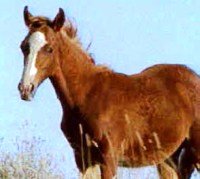What to Know Before Committing to Horse Ownership
"Taking care of a horse helps children to develop a good work ethic."

There are alternatives to owning a horse.
Keeping a horse can be expensive. Feed, tack, vet, farrier, vaccinations, stable tools, lessons, fencing, shelter, bedding, and supplies all add up. And most of these are not just one-time costs, but are recurring monthly costs. So before going horse shopping and jumping into horse ownership, be sure you are ready to make the financial commitment. Enough said.
Horse ownership, on the other hand can help bring a family together and help teach responsibility to children. A family horse encourages teamwork in caring for the horse and to take part in the enjoyment of riding activities. When other family members are interested in being part of the horse owning lifestyle, it is a lot of fun spending time together doing chores and riding as a family.
The hard work of having to take care of a horse helps children to develop a good work ethic. Also being around and handling a large horse helps children to gain self-confidence. These attributes will carry into adulthood.
A horse must be cared for every day, at least twice a day, 365 days of the year regardless of holidays, vacations, illness, or times of crisis. If you are going to be away or otherwise unavailable at any time, you will need someone who is readily available and dependable to care for your horse in your absence. Horses not only need to be fed, but need to be groomed regularly and the stall will need to be mucked out as well. And you will need to be available for vet and farrier visits.
If you're unable to make such a commitment, it is best to keep your horse at a boarding stable and pay someone else to take care of your horse. Your costs will be quite a bit higher, and you won't be able to spend as much time with your horse, but your worries will be fewer. Your boarding stable may provide you with some ways to reduce costs such as allowing you to work occasionally around the stable doing chores such as mucking stalls, feeding and grooming, and exercising horses. Sometimes, assuming your horse is suitable, if you allow your horse to be used for riding lessons, this will go toward your boarding fee.
Alternatives to Horse Ownership
Before going horse shopping, bare in mind there are alternatives to owning a horse if you decide you are not quite ready. Taking riding lessons allows you to improve your skills while being around horses. You get to participate in all the fun activities without having all the hard work and other expenses. This will also give you a better idea of your desire to own a horse.
You can find horse camps just about everywhere for both adults and children. These camps are designed to teach you horsemanship and provide extensive training and riding.
Leasing a horse is a good option if you're uncertain about the long-term commitment. With a leased horse, you have the full responsibility of horse ownership, but if you later decide keeping your own horse really is not for you, or the horse is not suitable, you are not stuck with the horse.
Co-ownership with a friend who is also a horse enthusiast is another way to reduce or share chores and expenses. You both get the enjoyment of having a horse, but with less cost and labor. This also allows you to more easily schedule for vacations and such.




